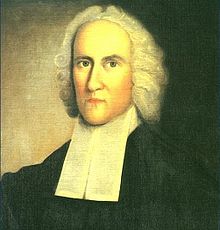While flying spiders may sound like something gamers would blast in the latest Xbox game, one young man saw in them the wisdom of God.
The technical term for how spiders seem to fly across a distance is ballooning. That observer noted of their flight “the exuberant goodness of the Creator, who hath not only provided for the necessities, but also for the pleasure and recreation of all sorts of creatures, even the insects.”
Those eyes self-trained to see the extraordinary hiding amid the ordinary belonged to Jonathan Edwards. His first published work, in 1723, examined the curious aerial habits of field spiders, a lowly creature ignored by the less discerning.
Looking for enlightenment in what others missed marked Edwards. Following his conversion at 17, he applied scientific observation to the study of both natural and spiritual realms. When the Holy Spirit fell upon his congregation in the early days of the Great Awakening, Edwards called on his understanding of science and the Spirit to observe and record the happenings. Later, that synergy helped Edwards make sense of this great move of God.
The great take risks, both in science and in the Christian life. For Edwards, detailing the workings of God in the lives of men and women put him at odds with established religious thought. Even the congregation he served for 20 years failed to grasp what Edwards understood of the work of the Spirit in the life of the believer. The man who many today consider America’s greatest theologian was dismissed in 1750.
Edwards tested the limits of physical science, too, occasionally offering himself as test subject. As an example to the Native Americans he loved and to whom he preached, Edwards embraced the relatively new science of inoculations to prevent disease. Risk is no respecter of persons, however. On March 22, 1758, a botched smallpox inoculation delivered the 54-year-old Jonathan Edwards into the arms of the Lord.
It’s not just field spiders people pass by without notice. Life in the Spirit goes unexamined by most.
“No man is more relevant to the present condition of Christianity than Jonathan Edwards,” wrote D. Martyn Lloyd-Jones. Indeed, the greatest need in the church today may be for the spiritual “scientist” who observes, tests, and comprehends the signs of the times.
Jonathan Edwards saw. And he understood.
Be the Edwards of today through the spiritual observations of the Edwards of yesteryear. Find that
wisdom in The Works of Jonathan Edwards.
Because the spiritual wisdom of the past unlocks the gateway to the future.
Today’s guest post is by Dan Edelen. Dan writes from his farm in southwest Ohio, where he lives with his wife and son. Since 2003, his blog, Cerulean Sanctum, has been challenging believers to question the status quo. Yet for all Dan’s online gravitas, people who meet him in person are more likely to comment on his NFL linebacker size, his fixation with board games, and his love of laughter.





